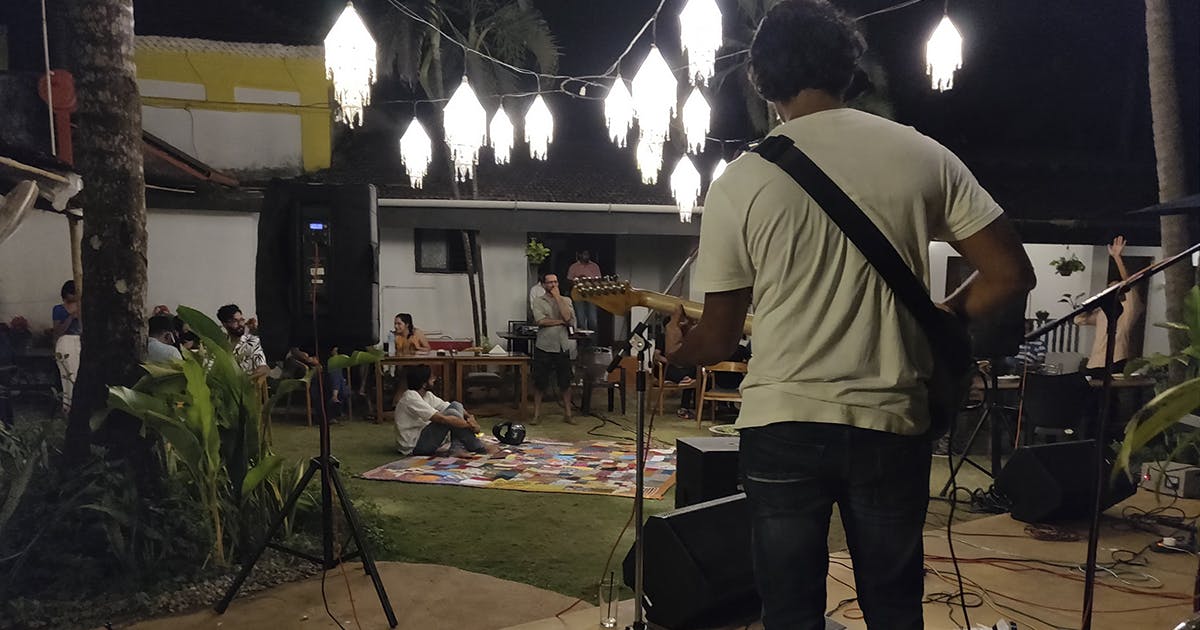What happens to the musicians, who have played cover songs of other musicians for decades in Goa, and now face the squeeze themselves?

Sadly, it isn't so dramatic as the headline might make it out to be. But the fact of the matter is that while everyone plays their politics, and extracts their own pound of flesh, we might well be around to see the demise of music in Goa, as we knew it.
A law here, another circular there, some copyright claim on the side... musicians are feeling the pinch of it all. You too are being blocked from celebrating in the style you prefer.
Don't get me wrong for a moment. One is not arguing in favour of having noisy concerts and shows all over the place. Villagers in Vagator, Anjuna and Siolim are protesting the noise caused by parties in their residential villages. And one can well appreciate their ire. This is also not an argument in favour of copyright violation.
Commercial establishments often play popular music to entertain their clients. If you walk into any mall, hotel, pub, restaurant or gym, you would probably hear a song you know. But this music is copyrighted as intellectual property. So any commercial establishment playing popular music needs to obtain a license from the "appropriate rights holder" to be able to play such music. And you get charged by the space you're playing it in.
Unfortunately, most of the debate tends to be one-sided and in favour of the 'collection societies'. Such collection and copyright societies work in the name of musicians, with whom they supposedly share what they earn. Since there's a lot of money at stake here, you can imagine how much of a bias will also come up in the information being put across to everyone.
Whenever there is any favourable judgement, the 'collection societies' are quick to claim credit and remind every outlet that they need to pay up.
Last week, news made it to the headlines when the High Court of Bombay (Goa bench) quashed and set aside a Goa government circular. Earlier -- in January 2024 itself -- this circular seemed to have given some relief to musicians to play cover versions of songs by international and other artistes.
This case, Phonographic Performance Limited vs. State of Goa, looked at the Government of Goa circular of Jan 30, 2024. The latter said; "Several complaints have been received stating that in respect of religious ceremonies including marriage/wedding festivities there is an insistence by certain organization/hotels to get permission from copyright societies for performance of musical work, communication to the public sound recording, etc..."
The circular argued that a July 2023 notice from the Ministry of Commerce and Industry, GoI, was very clear that "such performance of musical works, etc, at religious ceremonies, including weddings does not amount to violation of the Copyright Act 1957". It also argued that "other social festivities associated with [a] marriage" could not face "illegal demands of royalties/any fees for performance of musical works".
The courts were told about the "conduct of the copyright societies and/or persons purporting to be acting under such societies, who would forcibly enter a marriage function and demand that the sound recording being played at such functions be immediately stopped unless their demand for royalties or tariff was acceded to."
The court ruled that the Government of Goa circular "is in the teeth of the provisions of the Copyright Act".
In the past, when you bought a record or a cassette, it was presumed that you would have the rights to play it where and when you wished. Slowly, restrictions came into play. Now, you need licenses to play the music at a commercial venue. Some websites also warn that you would need a license to play that music at any venue -- commercial or non-commercial.
What happens to the musicians, who have played cover songs of other musicians for decades in Goa, and now face the squeeze themselves?
There are rare websites like spicyip.com, which focus on public interest and citizens' rights in this case. SpicyIP calls itself "one of India’s leading blogs/repositories on intellectual property (IP) and innovation law/policy. Through its independent reporting/analysis, SpicyIP is committed to fostering transparency within the Indian IP ecosystem."
It was founded in 2005 by Prof Shamnad Basheer, an IP academic and consultant, and the SpicyIP team comprises analysts and fellows, well versed in different aspects of Indian IP law and policy.
Lokesh Vyas, writing on March 26, 2024, in that website itself, focussed on the Goa circular of two months earlier. He asked: "Goa Circular, Permission for Music at Weddings, Police Sensitization: Anything New? Yes."
Vyas wondered "why is there even a need to issue such notifications when Section 52(1)(za) of the Copyright Act 1957 explicitly exempts 'the performance of a literary, dramatic or musical work or the communication to the public of such work or of a sound recording in the course of any bona fide religious ceremony or an official ceremony held by the Central Government or the State Government or any local authority.' The provision also carries an additional explanation which reads that 'For the purpose of this clause, religious ceremony including a marriage procession and other social festivities associated with a marriage.'"
It is time that the authorities take note and sort out the problems that musicians and those celebrating, with cover versions of music from elsewhere, get the relief they need. To have celebrations held hostage on claims of copyright is bizarre.
At the same time, the authorities need to sort out issues of sound pollution felt in certain parts of Goa. To claim that noise is necessary to keep tourists entertained is unfair to the resident population, and does not serve the long-term interests of musicians as well.